Do these 6 gallon RV water heaters work OK when it's, say 25 outside? Or colder? Water going into the water heater is slightly warmed by a heated water hose.
How about when it's windy? Can the water heater burner ever blow out?
We have a combination of 25s coming up tomorrow. 25 degrees high and 25 mph winds. More or less. Water is heated for showers only, so it would have to work an hour or less. All other freeze protection is in place: heat lamp, open cupboards, heaters going...
Right or wrong, the grey tank valve is left open. Can't have it freezing shut. Tanks and pipes are all well insulated.
How about when it's windy? Can the water heater burner ever blow out?
We have a combination of 25s coming up tomorrow. 25 degrees high and 25 mph winds. More or less. Water is heated for showers only, so it would have to work an hour or less. All other freeze protection is in place: heat lamp, open cupboards, heaters going...
Right or wrong, the grey tank valve is left open. Can't have it freezing shut. Tanks and pipes are all well insulated.

